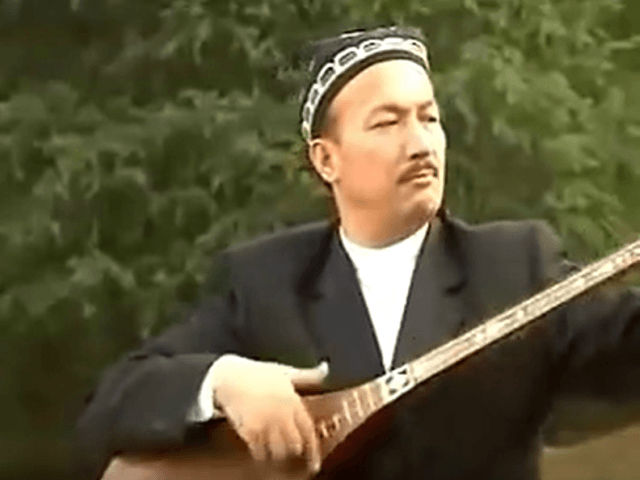China on Sunday responded to reports of noted Uighur poet and musician Abdurehim Heyit’s death in prison by posting a video of a man who claimed to be Heyit declaring himself to be in “good health.” The man was also suspiciously enthusiastic about being under investigation by Chinese authorities.
Heyit is one of many writers and artists from the ethnic Uighur minority in Xinjiang province imprisoned under nebulous circumstances, possibly rounded up and sent to massive “re-education camps” constructed by China. The Chinese originally set out to pacify the restless province but have recently intensified their efforts as part of a widespread crackdown on religious faith. The Uighurs are predominantly Muslim.
Heyit was one of the most popular Uighur poets and musicians, hailed as the “Dutar King” at the time of his arrest in 2017 (the dutar is a lute with a long neck with two strings popular throughout Central Asia). The reasons for his arrest were murky, but colleagues suspected he caught the attention of the Chinese by writing a song that referred to martyrdom in war, or more generally for music and poetry that appealed to Uighur ethnic pride.
The Turkish Foreign Ministry claimed on Sunday to have received information about Heyit’s death in a Xinjiang camp.
“We have learned with deep sorrow of the passing away in his second year of imprisonment of the distinguished folk poet Abdurehim Heyit, who was sentenced to eight years in prison for one of his songs,” said ministry spokesman Hami Aksoy.
“This tragedy has further reinforced the reaction of the Turkish public opinion towards serious human rights violations committed in the Xinjiang region,” Aksoy added.
China responded by using the social media accounts of China Radio International to publish a video purportedly showing Heyit alive, healthy, and quite sporting about spending over a year in a prison camp without having been tried and convicted on any specific charge.
“My name is Abdurehim Heyit. Today is February 10, 2019,” the man in the video said. “I’m in the process of being investigated for allegedly violating the national laws. I’m now in good health and have never been abused.”
Chinese Foreign Ministry spokeswoman Hua Chunying followed up with an angry statement on Monday blasting the Turkish government for its “vile” story about Heyit’s death.
“This proves he is not only alive but also in very good health. The Turkish authorities’ unfounded accusation against China, based on the lie about the false death, is extremely wrong and irresponsible,” Hua railed.
Critics responded by saying the video could not be authenticated, the man depicted in the video was clearly speaking under duress, and if it was indeed Abdurehim Heyit, China has merely proven that it arbitrarily imprisoned him in defiance of international human rights standards.
“This video has the feel of a Chinese forced TV confession, typically used on people with a voice: They are disappeared and coerced by police torturers to self-incriminate on TV, to pretend they’re OK,” said Cornell University associate professor Magnus Fiskejo, an expert on Chinese forced confession videos.
“It’s simply unclear when and where Abdurehim Heyit took the video,” said Patrick Poon of Amnesty International. “If the Chinese government is genuine in proving that he’s still alive, the easiest and most direct way of doing so is to allow him to talk to his family, friends and journalists directly, without any interference.”
Hurriyet Daily News called Turkey’s criticism of China a “rare move from a majority-Muslim power,” which helps explain the intensity of China’s outrage. Until now, criticism of China’s crackdown on the Uighurs and the pervasive surveillance they are subjected to has been restrained, and Chinese allies such as Pakistan have actually defended Beijing’s treatment of the Uighurs.
Radio Free Asia (RFA) on Friday cited reports that China has begun moving Uighur detainees from the crowded Xinjiang camps to prisons in other provinces. RFA obtained confirmation from Chinese prison officials that an unspecified number of Uighurs have been transferred. One official described the number of transfers as “huge” and said the Uighurs will be held under “heavy security” without visitation privileges.
Such transfers could prove embarrassing for China, which has claimed the Xinjiang camps are actually vocational training centers filled with happy Uighurs thankful for the opportunity to learn a trade. The prisons on the receiving end of these transfers could not be characterized as vocational schools with even the most fanciful imagination.

COMMENTS
Please let us know if you're having issues with commenting.